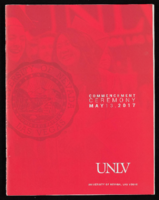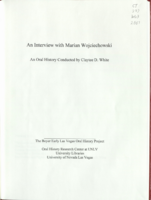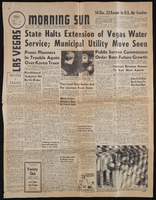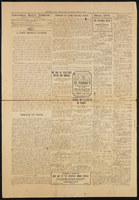Search the Special Collections and Archives Portal
Search Results
Bob Stupak Professional Papers
Identifier
Abstract
The Bob Stupak Professional Papers (approximately 1900 to 2007) primarily documents the career of Las Vegas, Nevada casino owner, Bob Stupak. The materials in the collection include the planning of two resorts in Las Vegas, Nevada created by Bob Stupak: Vegas World and the Stratosphere. The collection also includes planning materials for the Titanic Las Vegas, an unbuilt resort envisioned by Stupak. Planning and promotional materials for Stupak's resorts including photographs, memorabilia, audiovisual materials, advertising mockups, and architectural drawings. The collection includes several scrapbooks and photographs of Stupak and his wife Sandy at events around Las Vegas. The materials also document Stupak's political campaigns running for mayor of Las Vegas in 1983 and 1987 and lieutenant governor of Nevada in 2006.
Archival Collection

Summary report by the League of Women Voters on Legislative Reapportionment, "The Nevada Reapportionment Decision," October 1965
Date
Archival Collection
Description
League of Women Voters statement on legislative reapportionment and redistricting in Nevada.
Text

Las Vegas Sentinel Voice, October 20, 1983
Date
Description
Full edition of the October 20, 1983 issue of the Las Vegas Sentinel-Voice.
Text

Meeting minutes for Consolidated Student Senate University of Nevada, Las Vegas, November 15, 1984
Date
Archival Collection
Description
Text

University of Nevada, Las Vegas (UNLV) Spring 2017 commencement program
Date
Archival Collection
Description
Commencement program from University of Nevada, Las Vegas Commencement Programs and Graduation Lists (UA-00115).
Text

Transcript of interview with Arby Hambric by Claytee D. White, September 23, 2015
Date
Archival Collection
Description
Arby L. Hambric's book entitled, "To Thee I See: From picking in the fields of Texas to cooking for dignitaries on U.S. Navy ships, a journey I wouldn't change," describes his profound journey from working in the cotton fields as a child to being drafted into the U.S. Navy, before completing high school. During this interview, he recalls the significant achievements of the "Red Tails" and the Tuskegee Airmen. Beginning his 20 year Navy career before military integration, Arby describes the racial tensions that plagued the U.S. Navy in the 1940s, and discusses how he was able to successfully navigate that racist environment for two decades and three war eras. Arby enrolled in San Diego State College after leaving the U.S. Navy. He also worked as maintenance personnel for Sears and Roebuck and started a catering business with his wife. He became a member of the Southern Nevada Enterprise Community, SNEC Board upon moving to Las Vegas, Nevada, after his wife died. With a family legacy he can be proud of, Arby highlights the achievements of his great grandson Taquan Mizzell, a Virginia Cavaliers running back at the University of Virginia. As a Navy veteran, Arby often volunteered his time and resources to help others in need. He recalls driving the sick and elderly back and forth from the Westside community to Valley Hospital or University Medical Center, UMC. He also discusses government enforced road closures and a wall that was built to block Blacks from entering the new downtown. This interview sheds new light on military integration and offers key strategies for overcoming environmental racism. Arby mentions a documentary about the closing of the wall and offers his predictions on the future of the Westside.
Text

Transcript of interview with Marian Wojciechowski by Claytee White, June 16, 2009
Date
Archival Collection
Description
At age 95, Marian Wojciechowski recalls his personal story of being born a region called called Poland in 1914, just as World War I was beginning. This narrative gives special attention to his Polish background at a time when the country did not technically exist, and their language was forbidden. By the late 1930s and the dawning of World War II, Marian is a young man struggling to understand what is transpiring, but knowing that he must participate in the Polish underground resistance against the Germans His activism gets him arrested and sentenced to Auschwitz as a non-Jew and without penalty of death. He recalls the Gestapo beatings which have left him without feeling in his fingers and a loss of hearing. He shares historical perspectives of the war era, agricultural coops, goal of Germans to sell Jews to the United States and other countries, and a story about a woman who helped save 2500 Jewish children during war.
Text

Interview with Robert Rex Brownlee, August 6, 2007
Date
Archival Collection
Description
Text


